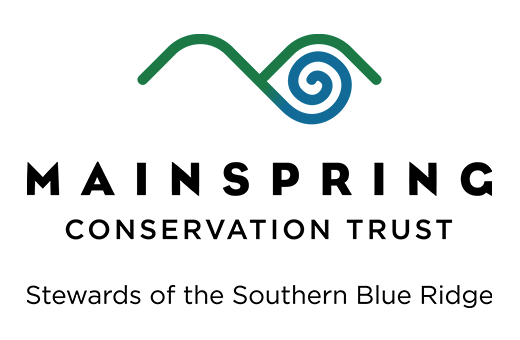This article was written by Ryan Hanchett of The Franklin Press on January 2, 2015.
[email protected]

After 18 years at the helm of the Land Trust of the Little Tennessee, Executive Director Paul Carlson is retiring from his position and will assume a part-time advisory role within the organization.
Carlson cited his health and a desire to spend more time with family as the primary reasons for his retirement.
“I have had a couple health concerns over the last year that caught my attention,” Carlson said. “After my older brother passed away unexpectedly it really kind of made me realize that maybe I need to step back while I am still relatively young and able to do the things I love.”
The decision to retire has been in the making for several months, and transitioning to a new executive director at the beginning of 2015 made sense for the organization.
“I think if I have a crowning achievement it’s reflected in the staff here at LTLT,” Carlson said. “I have thought about this transition for a while and obviously I knew there would come a time when I would no longer be executive director. Having such a dedicated and well-rounded staff has made it easy for me to feel comfortable with my decision.”
LTLT Deputy Director Sharon Fouts Taylor will succeed Carlson in the executive director’s chair. A Burningtown native, Taylor has spent her life in the rivers and streams of Western North Carolina. She also has served as Carlson’s land protection coordinator for more
than a decade.
“Sharon is smart, dedicated and extremely capable of handling the executive director’s role,” Carlson said. “She is a natural leader and I know she is going to do a great job.”
Since the inception of LTLT, the land trust has conserved approximately 24,000 acres of land in Western North Carolina – including 33 miles of Little Tennessee River frontage. The group has worked extensively in northern Macon County by purchasing the Needmore Tract, Hall Mountain and the historic Rickman Store.
“All of those projects are things that I look back on with great pride,” Carlson said. “Also, the projects we have done conserving watershed areas around municipalities like Waynesville, Sylva and Bryson City have helped protect major water sources and done a lot of good in our region.”
LTLT is currently working on a Nikwasi-to-Cowee Cultural Corridor project and looking at purchasing the old Duncan Oil property on East Main Street adjacent to the LTLT office space. Crews working with the underground tank division of the North Carolina Department of Environment and Natural Resources (NCDENR) are in the process of removing the underground fuel storage tanks at Duncan Oil in order to satisfy a potential brown field agreement between LTLT and NCDENR.
Once the brown field agreement can be finalized, LTLT will have the option to purchase the Duncan Oil property.
“Paul had the vision for this organization and without him the LTLT as it stands today would not have been possible,” Taylor said. “We have led the program together for the past 14 years, but it was his ability to see what was possible and make it happen that laid the groundwork for what we have accomplished.”
Carlson recruited Taylor to join the LTLT in the organization’s infancy. Before joining in 2001, Taylor was employed by the University of Georgia as a research technician on the Long Term Ecological Research Project at Coweeta Hydrologic Laboratory in Otto.
“He came to me 14 years ago and asked if I would help him protect the Needmore Tract, and we have been working side by side ever since,” Taylor said. “Paul is a very good planner and he tends to think about the big picture, so having him around as a consultant to advise us will be invaluable to the future of the LTLT.”
Taylor recalled several projects that she has worked on with Carlson, but one Macon County conservation effort stuck out in her mind as a particularly impactful accomplishment.
“One project that I am particularly proud of is the Gibson Bottoms tract,” Taylor said. “There were plans to put an RV park with cabins and a separate waste processing package plant on that land. We were able to go in and work with the land owner to conserve that area and I was able to help lead those negotiations, so that is something I am very proud of.”
Taylor looks at how to move group forward
In her first year as executive director, Taylor hopes to expand on the community involvement of the organization through citizen science and teaching opportunities.
 “We have the option to purchase this office space and that is something that we are going to really look into in the coming year,” Taylor said of the group’s current headquarters in Franklin. “I also want to increase our educational efforts and get the word out in the community of what we do as an organization. Our motto is ‘Conserve, Restore, Connect’ and I would like to strengthen the connect aspect of our work.”
“We have the option to purchase this office space and that is something that we are going to really look into in the coming year,” Taylor said of the group’s current headquarters in Franklin. “I also want to increase our educational efforts and get the word out in the community of what we do as an organization. Our motto is ‘Conserve, Restore, Connect’ and I would like to strengthen the connect aspect of our work.”
Biologist Jason Meador, the LTLT citizen science program manager, and LTLT senior scientist and aquatic program specialist Dr. Bill McLarney recently alerted officials with the N.C. Wildlife Resources Commission about brook trout infected with gill lice in tributaries of the Cullasaja River.
The NCWRC immediately alerted fishermen to be on the lookout for the parasites in their potential catches.
“Science is such a big part of what we do here and I think sometimes that aspect of our work may get overlooked because it isn’t necessarily as visible as the land conservation work,” Taylor said. “Stream bank restoration projects, water quality monitoring and collecting biological data are vital to LTLT and through our citizen science program it offers us a way to connect with people in the community.”
As far as long-term projects on the horizon, Taylor noted that the LTLT may have to look at organizational rebranding to better promote its work across all of Western North Carolina, not just in Macon County.
“Going forward, we may consider a name change in order to better represent who we are as an organization,” Taylor said. “When people hear Land Trust of the Little Tennessee they automatically think of Macon County. But we also serve six other counties (including Rabun County, Georgia) and other waterways such as the Tuckaseegee and Hiwassee rivers.”

